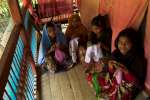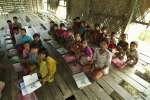Chinese actress Yao Chen shares refugees' stories with millions of fans
News Stories, 1 April 2011
MAE LA REFUGEE CAMP, Thailand, April 1 (UNHCR) – One of China's most popular actresses, Yao Chen, took on some new roles this week in a refugee camp in northern Thailand, picking up a hoe to dig a hole in a farmer's field, and learning elementary Thai from a small boy as she delved into the lives of ethnic Karen refugees from eastern Myanmar.
"I was deeply touched by how the refugees keep their dignity," said Yao Chen, UNHCR's honorary patron for China, after spending two days visiting refugees in Mae La camp, home to nearly 29,000 registered refugees and an estimated 16,000 unregistered refugees, all from Myanmar. "The refugees are beautiful inside. They have dignity and kindness, and poverty does not destroy their kindness."
Yao Chen said two details particularly touched her: the fact that a very well-educated 58-year-old refugee woman, who spoke perfect English and was capable of working and making a contribution, was now dependent on support from UNHCR and other agencies.
The second moving moment came at the end of an emotional two-hour conversation in a small thatched house on stilts with a family who told of a lifetime of torment in Myanmar. When the father got up to say goodbye, it turned out he had been sitting over a large hole in the bamboo matting floor.
"He didn't want his guests to sit there, he didn't want his babies to fall through, and he didn't want to show the condition of his house," Yao Chen said. "He was being hospitable, protecting his guests and his children, and showing dignity. I was very moved."
The family, who arrived from Myanmar in early March, have been allowed to stay temporarily in the vacant house of another refugee family, but they have no money to make repairs and have not yet been registered for food rations. They said they live on handouts from other refugees.
Naw Roza, 39, and her husband, Saw K'Lu, 36, told Yao Chen and eight accompanying Chinese journalists that they had never known a normal life in Myanmar, only a lifetime of forced labour, abuse and confiscations. Naw Roza said she was only five when the army torched her village and threatened to kill all adults, forcing everyone to flee to the jungle and rebuild their homes elsewhere.
Saw K'Lu said the army had forced him to work as a porter carrying ammunition. When he collapsed from exhaustion, he said, a soldier stabbed him in the side with a knife. He pulled up his shirt to show Yao Chen the scar.
Naw Roza broke down in tears when she recounted how the army often confiscated two-thirds of the pittance her husband could make from daily labour, leaving her without enough money to buy even rice for their eight children, who range in age from 18 months to 14 years.
Beatings, threats and even more extortionate demands for money finally drove them to flee in mid-February, she said, and the family walked three weeks to reach the camp. "We do not dare go back," Naw Roza said. "We are afraid we will be killed."
At an agricultural project funded by UNHCR, Yao Chen sparked some pleasant childhood memories while working alongside refugee farmers, many of whom are disabled. Taking a hoe, Yao Chen turned up a worm – just the kind she said she used to feed to ducks as a child on her grandmother's land in rural China.
In a classroom where UNHCR funds Thai language education, Yao Chen amused refugee children with her efforts to write the complicated Thai script.
According to Chinese media reports in March, Yao Chen ranks among the top five micro-bloggers in the world, on a par with United States President Barack Obama, with more than 7 million followers. Her microblog is carried by Sina.com, the largest Chinese language infotainment web portal.
This was her first visit to a refugee camp and she sent reports and photos direct from inside Mae La camp, the largest of nine refugee camps along the Thai-Myanmar border. Response from her fans showed she raised understanding in China about refugees.
At the end of her visit, Yao Chen observed that "when you see the refugees in this camp, they are all friendly and eager to know about the outside world. But when you talk deeply with them, you realize how much they have suffered."
As she left, Naw Roza, a Christian, clasped Yao Chen's hand and said: "I hope God will bring you back to us." Yao Chen replied that she had only started working for refugees last year, and "I hope to spend part of every year with refugees."
By Kitty McKinsey in Mae La Refugee Camp, Thailand
















































